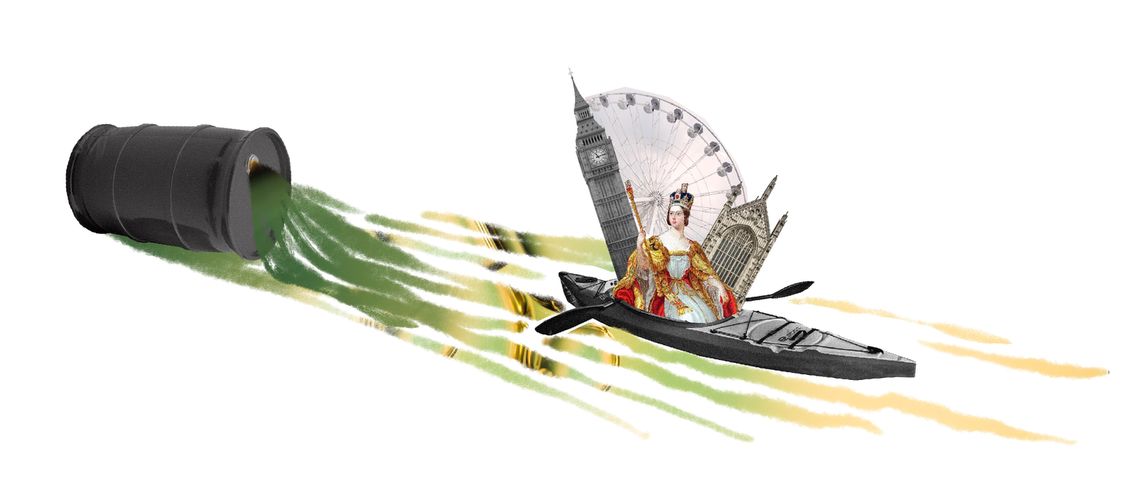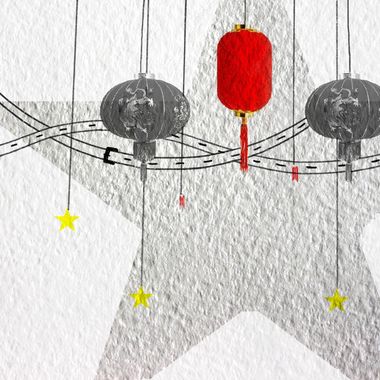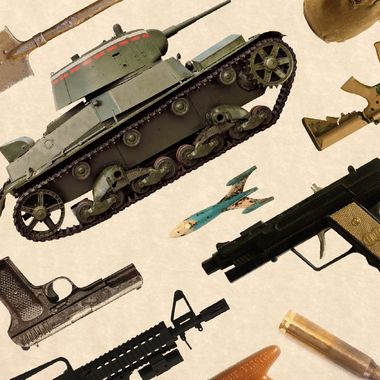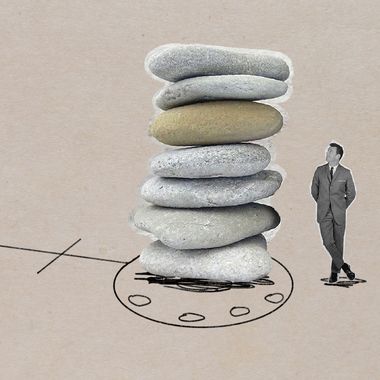
Illustration by Armine Shahbazyan.
It has been a year since the attack by Azerbaijan and Turkey against Artsakh, which upset the status quo and changed the regional balance of power. The South Caucasus is once again at the nexus of competition between the former regional empires of Russia, Turkey and Iran. Russian Foreign Affairs Minister Sergey Lavrov has suggested the creation of a 3+3 format (Russia, Turkey and Iran with Armenia, Azerbaijan and Georgia) to address the issues of security and unblocking economic and transport ties. The move is evidence of further marginalization of the OSCE Minsk Group format for resolving the Nagorno-Karabakh conflict, elbowing out the United States and France. While international media and regional analysts are still discussing the winners and the losers of the 2020 Artsakh War, less attention has been paid to the distribution of the spoils of war.
On September 2, 2021, the UK government announced that it has provided half a million pounds ($680,000) for training and recruiting personnel to help clear landmines, via the United Nations Development Programme (UNDP). The humanitarian aid is also meant to support British interests in the territories that came under Azerbaijani control after the 2020 Artsakh War. While the spilled blood was still fresh, British businesses were already focused on the profits to be made.
On December 1, 2020, British Ambassador to Azerbaijan James Sharp held a meeting with Azerbaijani Minister of Transport, Communications and High Technologies Ramin Guluzade to discuss the involvement of British companies in the transformation of the region. Later in February 2021, the UK government updated its "Overseas Business Risk" guidance for Azerbaijan to mention opportunities for British companies to be involved in the redevelopment of the areas taken in 2020, “particularly in the sectors of agriculture and food processing, mining, renewables and tourism.”
During the 2020 Artsakh War, the UK government was restrained in its announcements. The first debate in the (appointed) House of Lords about the ongoing war was held on September 30, 2020; members expressed concerns about the resumption of the conflict and especially by the reports of civilians being targeted. Though some parliamentarians were concerned about the recruitment of Syrian fighters from Idlib by a Turkish security company (obviously, with the endorsement of the Turkish government) to fight with Azerbaijan against the Armenians of Artsakh, the British government did not confirm the fact. A week later, on October 7, the Lords again expressed concern about the worsening situation and asked the government what steps they have initiated in response. They replied, “The UK is working at a number of levels to try to bring about an end to this, including in the OSCE and through our diplomats on the ground. Our Minister for European Neighbourhood has spoken to her counterparts and, yesterday, the Foreign Secretary issued a second statement with the Canadians. The U.S. President and Secretary of State have also issued strong statements calling for a return to the negotiating table.”
There were further parliamentary debates on October 13 and November 2, during which the genocide emergency alert issued by Genocide Watch about the situation in the Nagorno-Karabakh was brought up.
“Will Her Majesty's Government fulfill their duty to protect and make urgent representations to the UN Security Council to impose an embargo on the sales of arms to Azerbaijan and demand that Azerbaijan immediately stops all offensive attacks?” asked the Right Honourable Baroness Cox, a longtime champion for the Armenians of Artsakh. Baroness Sugg, representing the government, answered, “We remain deeply concerned about the conflict, regret the lack of progress towards a peaceful settlement and, of course, condemn any targeting of civilians. There is an OSCE arms embargo in place related to the Nagorno-Karabakh conflict and we believe that that is sufficient to ensure that the international community is not inadvertently party to attacks on civilians from either side. We will continue to make urgent representations to stop all offensive attacks, both directly to the parties and through the OSCE and the UN Security Council.”
At the end of October 2020, the UK government provided a £1 million ($1.36 million) aid package to “those affected by the Nagorno-Karabakh conflict” without clarifying how much would be allocated to either side of the conflict.
Meanwhile, the UK embassy in Azerbaijan and British companies were very active during the war, and especially after the war. The leader among them is Anglo Asian Mining PLC, a London-based company which has a portfolio of gold, copper and silver production and exploration assets in Azerbaijan. The company's main operating location is the Gedabek contract area, covering 300 square kilometers to the north of Artsakh. The Gedabek mine began operations in 2008, marking Azerbaijan’s first gold production since it gained independence from the Soviet Union. Anglo Asian Mining also has a second mine at Gosha, 50 kilometers from Gedabek. Ore mined at Gosha is processed at Anglo Asian's Gedabek plant.
Interestingly, in 1997, Anglo Asian Mining (in the name of RV Investment group services) signed an agreement with the Azerbaijani government to exploit mineral riches in the western part of the country, including areas under the control of the Nagorno-Karabakh Republic at the time. Out of the six mines mentioned in the agreement, only three of them were under Azerbaijani control. The representative of RV Investment group services was Reza Vaziri, who used to be a government official in Iran before the Revolution and today is the President-CEO and largest known shareholder in Anglo Asian Mining.
By signing over these rights, Azerbaijan was able to align the interests of Anglo Asian Mining, and thus to an extent also those of the United Kingdom, with its own. On October 27, 2020, the company announced to its shareholders that Zangilan (Kovsakan in Armenian) had come under Azerbaijani control, thus opening the prospect that it would be able to begin exercising the rights it had to the Vejnaly deposit, which is reported to contain 6.5 tons of gold. An expose by Open Democracy revealed the coordination between the British embassy in Baku and representatives of Anglo Asian Mining; the email chain’s subject header was “Anglo Asian and the land of opportunity”. While under Armenian control, the Zangilan mine was operated by Swiss-Armenian businessman Vartan Sirmakes.
Another gain for Anglo Asian Mining is the Sotk gold mine, which now straddles the border between Armenia and Azerbaijan. On November 26, 2020, with the withdrawal of Armenian forces, half of it was seized by Azerbaijani troops, again paving the way for the British company to operate there.
One more UK company that will gain from the Azerbaijani victory is Chapman Taylor, which won a $2.4 million sole-source contract to create a new master plan for the city of Shushi, which was captured by Azerbaijani forces in the last days of fighting. It’s not the first mega project realized by Chapman Taylor in Azerbaijan. They have already constructed Port Baku Towers, which is a modern high-rise office tower, and Ganjlik Mall, Azerbaijan’s largest shopping center. Other projects include Deniz Mall and the K Residence luxury apartment complex. Interestingly, they cooperate and implement the projects with PASHA Holding, which belongs to Aliyev’s daughters. When investigative journalist Khadija Ismayilova revealed the ruling family’s stake in these projects in 2014, she was jailed in 2014.
In May 2021, President Ilham Aliyev of Azerbaijan once again invited British companies to make investments in the newly occupied territories, at a meeting with UK Minister for Exports Graham Stuart.
The recently leaked Pandora Papers also shed light on Aliyev’s and his close associates’ personal ties in the UK. Through offshore companies meant to conceal the identity of the true owner, the Aliyev family acquired luxury properties worth $700 million. Their dealings included a direct transaction with the Crown Estate.
The United Kingdom’s readiness to deal directly with Azerbaijan represents a double standard in foreign policy. While the UK has just recently imposed a significant package of economic sanctions (including trade, financial and aviation sanctions) against Belarus on the anniversary of President Lukashenko’s fraudulent election, it is simultaneously deepening ties with Azerbaijan, which also held a fraudulent election in 2020 and leveraged its assets to restart a military conflict. According to the Global Democracy Index 2020, Belarus ranks 148th in the world and Azerbaijan 146th.
Actions speak louder than words. Armenians often wrongly group “the West” all together as if it were a monolith. When they see the British government involved in this type of behavior, it feeds the narrative that human rights and democracy are merely excuses to be invoked (or neglected) when there are really other interests at play.
Also see
What Is France Looking for in the Nagorno-Karabakh Issue?
By Gaïdz Minassian
Since the 2020 Artsakh War, France has been at the forefront of diplomatic activity in resolving the Nagorno-Karabakh conflict. What goal is Paris hoping to achieve with this issue that is so far removed from the concerns of the French?
Was China All Innocent During the 2020 Artsakh War?
By Paruyr Abrahamyan
China considers Turkey a key strategic partner under the Belt and Road Initiative. It has also intensified economic relations with Azerbaijan and is keen to diversify its commercial routes to Europe. Was China a silent observer or did it have any role to play during the 2020 Artsakh War.
The Escalating Tensions Between Iran and Azerbaijan
By Hranoush Dermoyan
Since the end of the 2020 Artsakh War, tensions between the Islamic Republic of Iran and Azerbaijan have been escalating. Although an outright military confrontation seems unlikely, it would have devastating consequences for the region.
Arms Supplies to Armenia and Azerbaijan
By Hovhannes Nazaretyan
For nearly three decades, Armenia and Azerbaijan have been buying large quantities of weapons from a number of countries. Hovhannes Nazaretyan presents a comprehensive list of weapons acquired by both countries since independence.
A White Paper to Build a Security Architecture
By Tigran Yegavian
What has Armenia’s defeat in the 2020 Artsakh War revealed? Tigran Yegavian reviews a recently published White Paper that looks at a number of misconceptions, failures and dysfunctions within Armenian statehood and attempts to diagnose those ills and offer possible solutions.
Who Is Responsible For the 2020 Defeat?
By Gaïdz Minassian
Gaidz Minassian delves into the turbulent spaces of history, memory and identity and deconstructs why the mother of all battles—the construction of a State on its sovereign pillars—was undermined.









